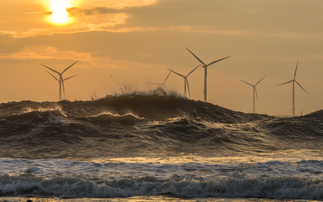As the EU prepares to strengthen its climate goals, the US demands the term is axed from future trade deals - the UK faces some tough choices post-Brexit
All eyes may be on the British election, for obvious reasons, but as the UK's main parties battle it in an increasingly desperate attempt to prove who is the least unfit to rule, the EU is quietly getting on with some bold new climate policy plans that could have huge implications for business right across the bloc - including in the UK.
Yesterday saw the European Corporate Leaders Group (CLG Europe), which includes some big name brands such as Unilever and Coca Cola European Partners, wade into the on-going debate over whether or not the bloc should revisit its emissions targets for 2030.
Incoming European Commission President Ursula von der Leyen secured the post on a platform that promised to deliver a Green New Deal within 100 days, revisit the bloc's emissions reduction goals for 2030, and push for the introduction of a long term net zero target.
Work is now underway on those plans and while some carbon intensive industries are lobbying hard against more ambitious targets, CLG Europe today presented the counter-argument as it called for a significant strengthening of the current target to cut emissions 40 per cent by 2030.
"CLG Europe… supports an increase to at least 55 per cent," the group stated in a new position paper. "A 55 per cent target is in line with recent studies suggesting that a minimum of 55 per cent reductions for 2030 is both necessary to remain in line with the 2050 climate neutrality goal, and feasible from a technical and economic point of view, with early action being more cost-effective than delay. As business leaders who aspire to build the climate neutral economy of the future, we urge [the EU] to agree the necessary policy foundations and set the direction of travel that will provide us with the clarity and confidence to act as rapidly and boldly as possible."
It is far from a done deal, but support for a serious ramping up of the EU's decarbonisation plans is building. Analysis has shown the bloc is likely to meet its current 2030 emissions target with no new policies and that it would be economically beneficial to move faster. Von der Leyen has made it clear she favours a stronger 2030 target as well as a clear net zero goal for 2050 at the latest. A majority of MEPs and most of the bloc's most powerful member states appear to agree. Meanwhile, the pressure from businesses, investors, and civil society for the EU to deliver a significant upgrade of its climate policy ambition ahead of next year's COP26 Summit in order to try and secure a similar move from the likes of China is intensifying by the day.
At the same time the promised Green New Deal programme and the EIC's recent pledge to crank up clean energy investment provides a route for addressing at least some of the concerns harboured by carbon intensive member states and industries.
It is highly likely that at some point over the next 12 months the world's largest single market will deliver a significant strengthening of its climate targets and supporting policy framework, unlocking major investment opportunities for green businesses.
And regardless of how the UK's 'Brexit election' plays out, the debate underway in Brussels matters here too.
Firstly, as the polls start to show the smaller parties being squeezed once again it remains conceivable that a minority Labour administration could yet deliver a softer Brexit plan that would keep the UK firmly within the EU's policy orbit regardless of the result of a promised second referendum.
Secondly, as yesterday's explosive leaked US trade talk documents demonstrate, if the Conservatives maintain their healthy poll lead over the next fortnight and secure the majority they crave then they may 'get Brexit done' in terms of passing a Withdrawal Agreement, but attention will then immediately turn to the next stage of Brexit trade talks with both the EU and the US.
These talks will pull the government in completely contradictory directions. On one hand, yesterday's documents suggest the US will refuse to even mention climate change, let alone include climate-related safeguards. At the same time the White House will also push for the UK to accept demonstrably lower environmental standards for imported goods. On the other hand, the EU has made it absolutely clear that any future trade deal with the UK is contingent on continued close alignment on environmental standards and climate goals.
The UK's Climate Change Act, net zero target, and carbon budgets should make a deal with Brussels possible, given both the EU and UK are committed to deep decarbonisation. But EU fears that the UK could yet seek to undercut it on green rules will only intensify if the bloc does adopt more ambitious environmental goals for its members. Add in the continuing influence of those Conservative MPs who crave a deregulatory agenda above all else, and the EU has every incentive to demand that the UK remains largely aligned with its climate strategy. As such, UK businesses would be wise to keep a close eye on EU green policy developments, as they could yet shape British policy goals for years to come.
Get Brexit done? It's not quite that simple.
A version of this article originally appeared in the BusinessGreen Overnight Briefing email, which is available to all BusinessGreen subscribers.









